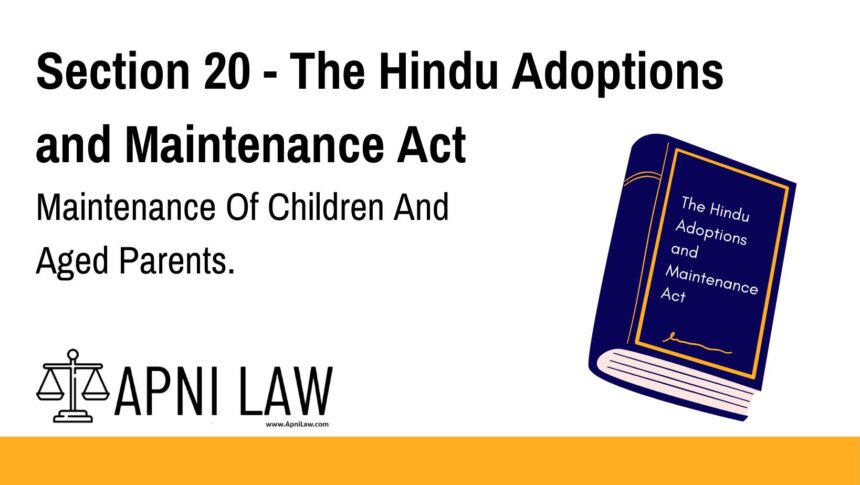Code: Section 20 of the Hindu Adoptions and Maintenance Act, 1956
(1) Subject to the provisions of this section a Hindu is bound, during his or her life-time, to maintain his or her legitimate or illegitimate children and his or her aged or infirm parents.
(2) A legitimate or illegitimate child may claim maintenance from his or her father or mother so long as the child is a minor.
(3) The obligation of a person to maintain his or her aged or infirm parent or a daughter who is unmarried extends in so far as the parent or the unmarried daughter, as the case may be, is unable to maintain himself or herself out of his or her own earnings or other property.
Explanation.—In this section “parent” includes a childless step-mother.
Explanation of Section 20
Section 20 of the Hindu Adoptions and Maintenance Act, 1956 imposes a legal obligation on Hindus to provide maintenance to their children (legitimate or illegitimate) and aged or infirm parents. This provision ensures support for dependents who are financially or physically unable to take care of themselves.
Key Provisions:
- A Hindu (male or female) is legally bound to maintain:
- Legitimate or illegitimate children
- Aged or infirm parents
- Unmarried daughters (as per sub-section 3)
- The child’s right to maintenance is valid until:
- The child is a minor (i.e., under 18 years of age)
- The duty to maintain aged or infirm parents and unmarried daughters exists:
- Only if they cannot support themselves through personal income or property
- The term “parent” explicitly includes:
- A childless stepmother
This section plays a crucial role in upholding family responsibilities and offering legal protection to vulnerable family members who may otherwise lack financial security.
Illustrations
Example 1: Minor Child’s Right to Maintenance
A Hindu man has an illegitimate child. As long as the child is a minor, the father is legally required to provide maintenance—even if the child does not live with him.
Example 2: Support for Unmarried Daughter
An unmarried Hindu daughter who is unemployed and has no property or income can claim maintenance from her parents, provided they are financially capable.
Example 3: Aged Parent Without Income
A Hindu woman’s father is aged and infirm and has no source of income or property. She is legally obligated to provide him maintenance under Section 20(1), if she has the financial means.
Common Questions and Answers
1. Who is obligated to pay maintenance under Section 20?
Every Hindu (male or female) must maintain their:
- Legitimate and illegitimate children (if minors)
- Aged or infirm parents
- Unmarried daughters (if financially dependent)
2. Can a stepmother claim maintenance?
Yes. The explanation in Section 20 includes a childless stepmother as a “parent” entitled to maintenance.
3. Until what age is a child entitled to maintenance?
Children (legitimate or illegitimate) can claim maintenance until they are minors—i.e., under 18 years of age.
4. Is there any condition for parents to claim maintenance?
Yes. Parents must be aged or infirm and unable to maintain themselves through their own income or property.
5. Are both sons and daughters equally responsible?
Yes. The obligation applies equally to Hindu sons and daughters.
Conclusion
Section 20 of the Hindu Adoptions and Maintenance Act, 1956 imposes a compassionate yet enforceable duty on Hindus to care for their children, aged parents, and dependent unmarried daughters. By legally binding individuals to support their immediate family members, this provision reinforces traditional family values while ensuring economic justice and support for the vulnerable.
For detailed legal assistance on maintenance rights under Hindu law, consult the experts at ApniLaw.








